Welcome to the week.
Here are the most notable stories our writers and readers have come across in the past seven days…
Irony of tech: It says an awful lot about the state of transportation in America that a conference devoted to mobility technology is hosted by a place that is so difficult to move around in. (Jalopnik)
The Tesla files: I won’t trust anyone at US DOT with road safety until they shut down Tesla’s absolutely B.S. “self driving” feature, which has once again caused real harm to innocent road users. (The Intercept)
Cost of cars: $340 billion. That’s how much a new NHTSA report says traffic crashes — which accounted for 36,500 deaths, 4.5 million injuries, and 23 million damaged vehicles — cost the American people in 2019. (NHTSA)
Why crashes happen: Because police reports are often too incomplete to fully reckon with why serious crashes happen, some cities are putting together independent commissions to review them and make recommendations. (Bloomberg)
The debate that will never die: In case you wanted to brush up on your helmet arguments, here’s the latest installment from a major media source. (Slate)
It’s a bike lane, jerk: The issue of car users parking their vehicles in bike lanes has transcended activism circles and finally seems to be getting the attention it deserves. (Mother Jones)
Post collector: When a person’s predilection for picking up Portland’s plastic posts ends up as an essay and reflection on safety, you know the issue has reached new heights. (candlesticks on tumblr via Oregon Humanities Magazine)
Widespread risk: Interesting how this automotive industry outlet reports on the threat posted by huge and heavy EV-cars only when they can frame it as something that will impact (pun intended) other car users. (The Drive)
Layoffs: Seven Oregon-based employees of Specialized have been let go as part of nationwide layoffs at the California-based bike company. (Bicycle Retailer)
Cars are the problem: It’s heartening to see growing support in media sources worldwide that the best way to alleviate traffic is to zero in on making it harder to drive, not easier. (Dezeen)
Gas in houses vs gas in cars: The gas stove debate is about how an ubiquitous form of emissions has gone largely unnoticed by most people, thanks to a coordinated lobby effort. Sound familiar? (Streetsblog USA)
Thanks to everyone who shared links this week.



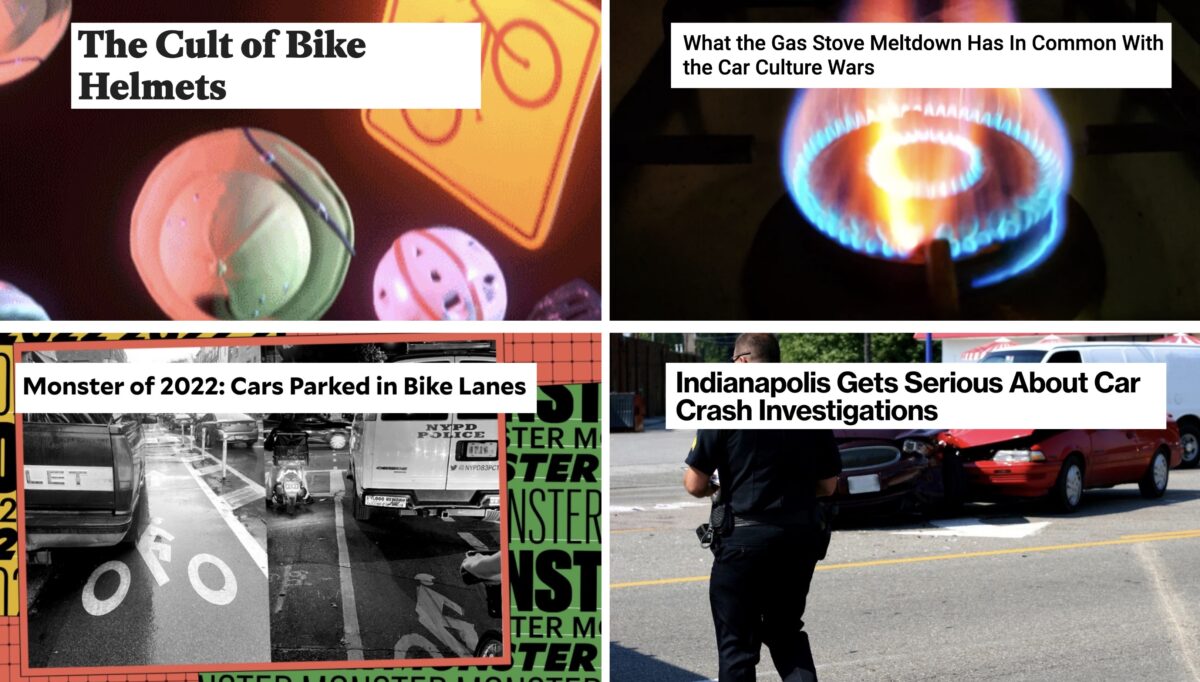
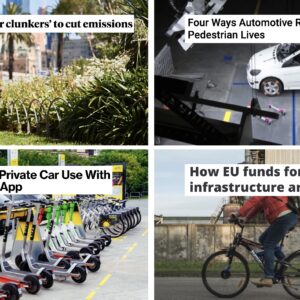
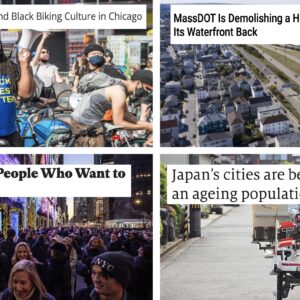
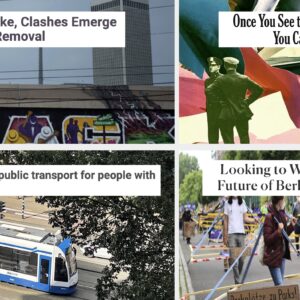
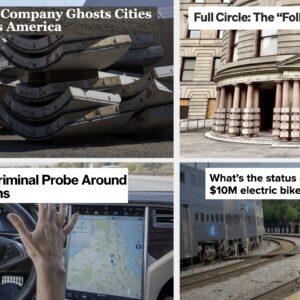
Thanks for reading.
BikePortland has served this community with independent community journalism since 2005. We rely on subscriptions from readers like you to survive. Your financial support is vital in keeping this valuable resource alive and well.
Please subscribe today to strengthen and expand our work.
Cooking with gas: the big difference between gas stoves and gas cars is the effluent from the stove is most concentrated in the living space of the users and the personal choice impacts them immediately and at a higher concentration than the rest of the community.
If car exhaust were shared on that basis there would be no controversy about health, safety, or the justice of releasing it to a common environment.
Methane emissions from stoves are estimated to be 0.2-0.4% of total US methane emissions. On the other hand, ~55% of US methane emissions are a direct or indirect result of agriculture and biowaste (of which animal agriculture is, by far, the largest component).
Beautiful climate movement progress:
Isn’t a big part of the methane emissions from the infrastructure needed to pipe gas to every individual home leaking? I think gas leaks are a big source of methane emissions, and the ideal goal would be to remove any need to have gas piped to every home, with all the myriad places for small (and large) leaks to occur. Here in the PNW especially, heat pumps are more efficient (yes even considering burning gas to generate electricity) and gas ranges are unnecessary. Gas ranges are kind of used as a wedge or the “camel’s nose” to keep the infrastructure in place.
But, to your point, I don’t know how much of the whole of methane leaks are. I’d be curious what is in that other 45%, as that’s not a small number.
The 0.4% estimate comes from a recent paper whose model suggests larger “leaks” than the literature as a whole. (This paper was widely touted on social media even though it remains an outlier.)
https://pubs.acs.org/doi/10.1021/acs.est.1c04707
Predominantly the use of methane in power plants and industrial processes (e.g. fertilizer production) as well as fossil fuel extraction. Estimates of methane emissions from the fossil fuel industry itself range from 15-22%.
Isotopic analyses suggest that the rapid increase in methane emissions since 1996 (see above) is from microbial sources (e.g. animal agriculture).
Top panel: Ch4 emissions based on global atmospheric monitoring.
Lower panel: Fossil-fuel-derived emissions.
https://research.noaa.gov/article/ArtMID/587/ArticleID/2769/New-analysis-shows-microbial-sources-fueling-rise-of-atmospheric-methane
https://www.nature.com/articles/s43247-022-00488-5
https://agupubs.onlinelibrary.wiley.com/doi/10.1029/2021GB007000
If only there was a product that allowed for venting the harmful gasses outside the home, and there was a regulation that supported including make-up air into the home in the case of a product like this being particularly strong. Oh well, guess we should just ban them.
I find that reading the article before commenting allows for a more informed discussion.
Literally no one is talking about banning gas stoves. The closest thing you can find in the real world is a few cities (not Portland) restricting gas hookups in new construction, something that I, a gas stove owner, totally support.
The Bike Lane Uprising database just came back online today after months of being offline due to insufficient funds for the server. You can join, donate, and/or report vehicles parked in the bike lane.
The Debate That Will Never Die: A great read, well-written, neither pro nor anti helmet.
It came off as pretty pro helmet to me just anti helmet mandates. I still think there’s too much fear mongering about helmet use and it discourages ridership by making cycling out to be much more dangerous than it really is. It’s all about context for me. I never wear a helmet when I ride my cruiser a few miles down the road because the odds of falling are quite low and hitting my head even lower. In the winter though when I’m commuting to work bombing down hills in the dark, wet and ice I certainly have it on.
For most of the casual type of riding I see people doing around town however a helmet is pretty low on the list of safety priorities. Honestly even for my work commute it’s still one of the lowest priorities. Good breaks, lights, heck even a bell are much more important than a helmet to me.
In general I agree with you, and for people reading this article who may have a personal bias in favor or against helmet usage, I doubt very many people would debate you on this, that helmets are ultimately designed for faceplants. But for the target audience that includes government safety policy types who think wearing a helmet will save X number of bicycle users involved in car crashes and that every user ought to be required to wear one at all times, this article spells out why exactly bike helmets are not designed to do that – that in most bike versus car crashes, personal fatal injuries tend to not involve the head but other, usually unprotected, body parts such as the spine, torso, and bleeding to death, of which a helmet is utterly useless. More useful would be to provide better bike infrastructure, slow car users down, and so on.
Most crashes, however, are not that sort of dramatic bike-car crashes. There are lots of low impact crashes, especially for less experienced riders, that could result in a bonked head.
I don’t really care what other people do, but I see a helmet as very cheap insurance against an unlikely (on any particular ride) event that could instantly transform my life in a hugely negative way. Seat belts are much the same. I’ve never needed one, but I still buckle up even on short low speed drives. See also ski helmets.
Agreed! I consider myself a very experienced and confident bicyclist – I ride my bike nearly every day, both for commuting and for fun on all sorts of roads, and wear a helmet every time I do it. I’ve never thought I really “needed” it and have zero hope or expectation that the helmet will do anything for me if and when a driver of a car decides to take me out. However, when my back tire randomly and completely unexpectedly skidded out underneath me when turning on a super wet road back in December, I was glad I had it on. I was down and up so fast (and kind of embarrassed!), I didn’t even assess anything until I got home, but knew my head had hit the the curb. Sure enough – unlucky spot to go down, and giant dent in the side of the helmet.
I don’t think there should be helmet mandates…to each their own. But in the unlikely event I have a nothingburger fall like that again, I’ll forgo the chance of a concussion every time. I wish we’d be more realistic about what helmets do and don’t do so people can be better informed to make a choice that’s best for them.
I don’t either, and yet, I can’t help but introspect a bit.
I totally do think there should be a helmet mandate for street motorcycles and also 30 MPH gasoline motocycle (like a conventional scooter). I can’t figure out where I would draw the line. I think someone on a 30MPH electric motorcycle that happens to resemble a bicycle should probably be required to wear a helmet. So maybe a mandate for fast electric cycles but not slower ones or pedaled bikes?
Or is it that I don’t think a helmet law should apply to my preferred mode, but only to other people?
My political positions are generally governed by some sort of explainable, logical framework, and it frustrates me that I can’t figure one out in this case.
You make really good points and I don’t necessarily know who should/would draw lines, and how they would decide that.
I suppose in this moment with not too much time spent thinking about it… I’d probably draw the line at “do you entirely power the ‘vehicle’ on your own”? If yes, no mandate. If no (i.e. any form of gas- or electric-powered thing, even those that are just electric assist or look a whole like regular old bicycles). I know on human powered bikes, we can go as fast as some e-things, but there is perhaps an inherent difference in the level of control one has while doing so. (Though I acknowledge this could entirely be my bias in how I feel on either mode! And why I really dislike riding e-bikes myself…)
And I see your question of whether or not it’s just a bias based on one’s preferred mode of transportation? And that this case makes it very challenging to know what is the right answer. What is the line or balance between regulating everything versus going back to few regulations at all. I mean, I spent my entire childhood riding around laying down in the back on the station with buddies, and sitting in smoke-filled restaurants, and I survived! 🙂 (kidding….)
“My political positions are generally governed by some sort of explainable, logical framework, and it frustrates me that I can’t figure one out in this case.” I agree, it is very frustrating!
Confirmation Bias is probably a big part of why I liked that article so much 🙂
I’ve always believed a helmet is just part of the equation – defensive driving is my first safety measure out there, followed by lights & reflective elements for visibility, choice of lower danger routes and finally helmets.
I can’t stand the non-rider fixation on helmets being the focus of bike safety.
That said, I don’t ride without one:
Also, I have had a single vehicle roll-over on my trike at 30mph. Though the helmet didn’t prevent the concussion, the shattered wrist or the gash in my chin that needed 2 layers of stitches, it did prevent giant gouges in (already beat up) scalp (you should have seen the left hand top surface of the helmet – the gouge went through the plastic covering and into the expanded foam underneath by quite a bit.
While helmet mandates are poor health policy (riding without a helmet still adds years over not riding), helmet giveaways are probably good policy.
Here’s one that somehow didn’t make the roundup –
Amsterdam calls for crackdown on menace of souped-up e-bikes
https://www.theguardian.com/world/2023/jan/14/amsterdam-crackdown-souped-up-e-bikes-dangerous-streets
I got a Tesla a month ago and love it. I was driving in FSD beta for first time last Monday on I84. I went to change the radio station when in that very second the driver next to me cut me off, like the worst cutoff I’ve ever seen but my car avoided the collision. So I wouldn’t be so quick to judge FSD. Let’s see what the investigation turns up. My experience with people driving is not so great so I’m thinking more safety features are needed. Tesla released their safety data for per mile driven and it’s great. Also, I guarantee you that data and how it is sourced is being looked at by lawyers and risk assessment experts. Let’s just assume it will have to hold up in court at some point. Tesla is sharing it publicly and it is a great safety improvement by the numbers. Just as many drivers don’t like the concept of tolls or congestion fees, biking advocates should be pragmatic too about what really works. https://www.tesla.com/VehicleSafetyReport
I would never buy a Tesla because the owner of the company is an authoritarian right wing a-hole anti science idiot, but that’s just me…..
Cut the guy some slack. He deserves a fair bit of credit for dismantling Twitter.
Which is probably why Trav got cut off, I hear it’s now a thing other motorists do to Tesla drivers.